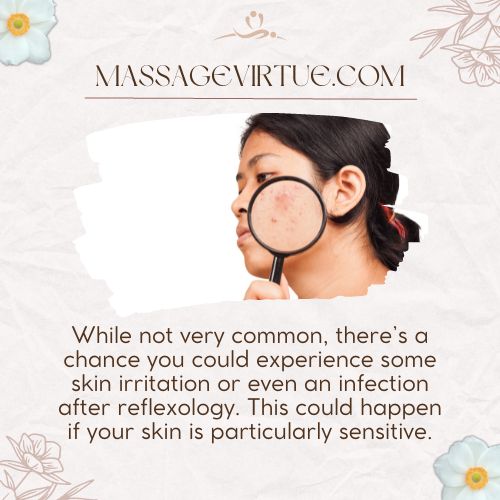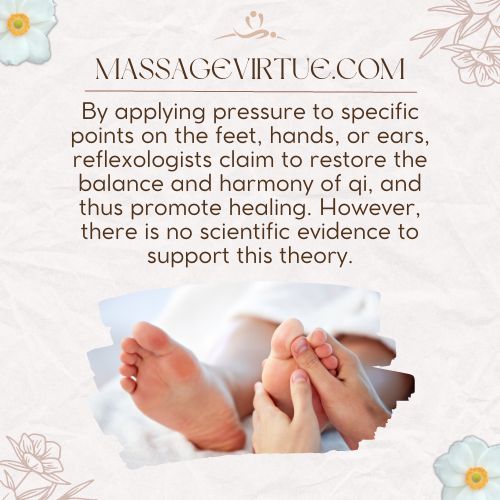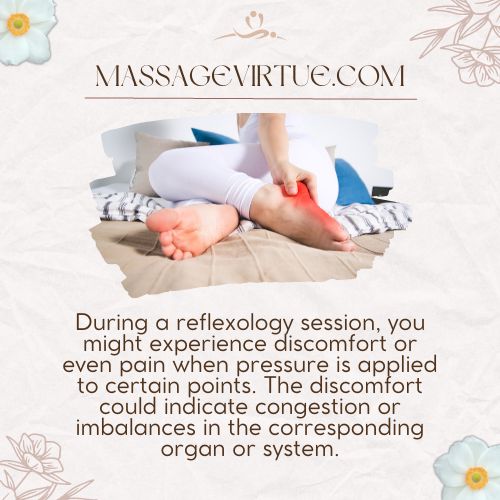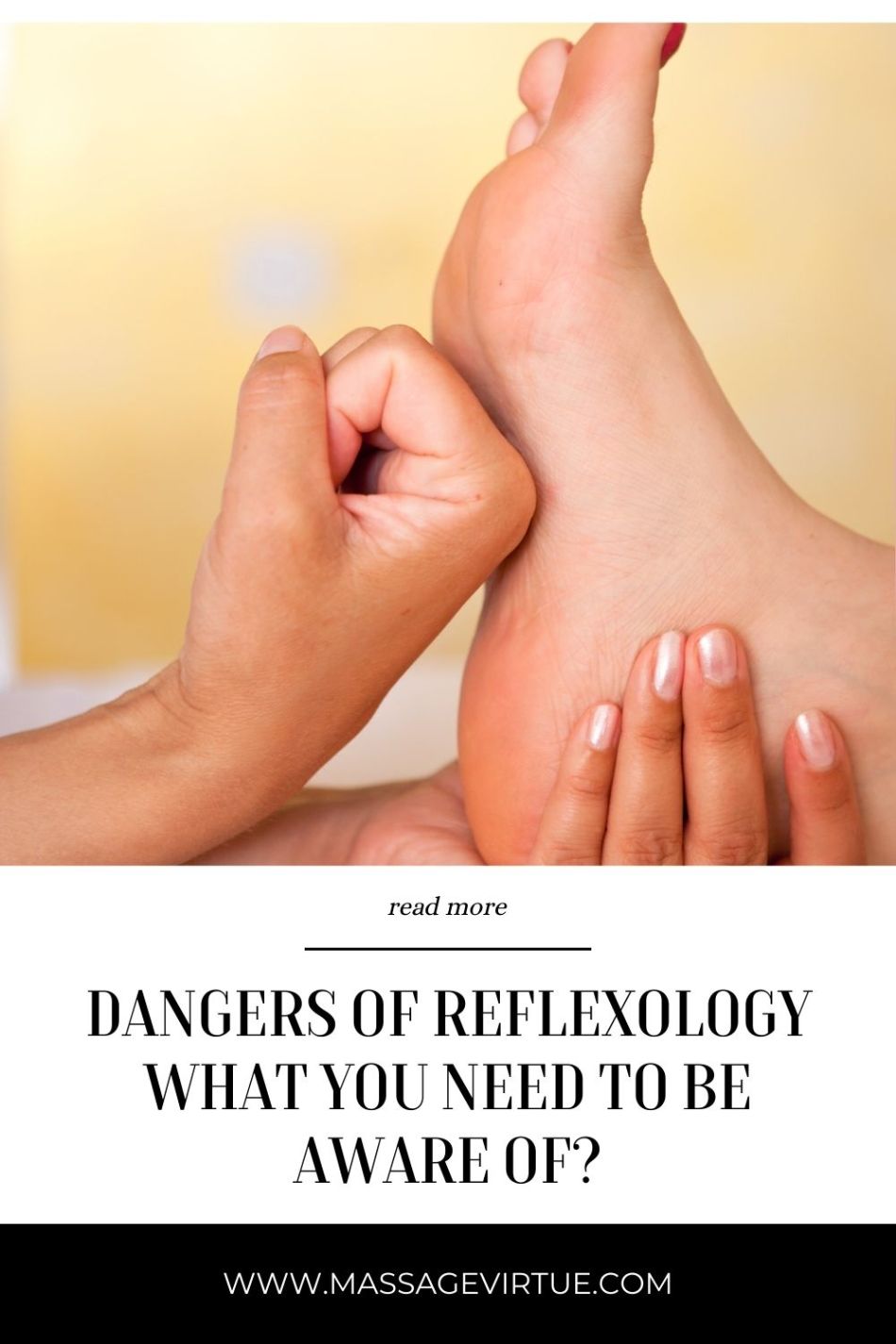Have you ever heard of reflexology? It’s a therapeutic practice that involves applying pressure to specific points on the feet and hands.
Many people swear by its benefits.
There’s also a growing concern about the potential dangers of reflexology.
In this article, we’ll delve into the world of reflexology, examining its pros and cons, and shedding light on who should approach it with caution.
Side Effects of Reflexology
Reflexology is generally considered a safe and non-invasive therapy, but it may cause some side effects in some people. These side effects include:
1. Lightheadedness
You might feel a bit lightheaded or dizzy after your reflexology session. This is quite normal and could be a result of your body responding to the relaxation triggered by the therapy.
Don’t worry, though – it’s usually a fleeting sensation as your body gets used to the changes.
2. Nausea
Sometimes, reflexology could lead to temporary nausea or even make you feel like vomiting.
This reaction might be connected to the release of toxins or the deep relaxation induced by the treatment.
Drinking water and taking it easy after the session could help ease these sensations.
3. Headache or Migraine
Having a headache or even a migraine after reflexology is something that can happen.

This could be your body’s response to the shifts in energy during the treatment.
Don’t forget to keep yourself well-hydrated and get some rest – that usually does the trick to soothe any discomfort.
4. Emotional Sensitivity
Reflexology may trigger emotional sensitivity or mood swings in some cases.
Since the therapy aims to balance energy, these reactions might indicate that your body is releasing some pent-up emotions.
Give yourself the time you need to process and understand these feelings.
5. Increased Urination
You might notice that you’re making more trips to the bathroom for urination or bowel movements after a reflexology session.
This is your body’s way of trying to get rid of waste and toxins. Stay hydrated and allow your body the time it needs to adjust.
6. Skin Irritation
While not very common, there’s a chance you could experience some skin irritation or even an infection after reflexology.
This could happen if your skin is particularly sensitive.

To prevent this, it’s essential to ensure that your reflexologist maintains proper hygiene.
7. Muscle Soreness
Feeling your muscles a bit sore or experiencing fatigue after reflexology is possible, especially if certain pressure points were worked on intensely.
The good news is that these sensations usually fade within a day or two.
You can help your body recover by doing some gentle stretches and keeping yourself well-hydrated.
Is Reflexology Real?
Reflexology is based on the theory that the body has a natural energy flow called qi and that blockages in this flow can cause illness.

By applying pressure to specific points on the feet, hands, or ears, reflexologists claim to restore the balance and harmony of qi, and thus promote healing. However, there is no scientific evidence to support this theory.
The pressure points used in reflexology are not based on anatomy or physiology.
It is on ancient Chinese maps that have no scientific basis.
Some studies have suggested that reflexology may have some benefits for certain conditions, such as stress, pain, anxiety, and depression.
What Does It Mean When a Reflexology Point Hurts?
During a reflexology session, you might experience discomfort or even pain when pressure is applied to certain points.
This might sound alarming, but it’s essential to understand the underlying principle.

The discomfort could indicate congestion or imbalances in the corresponding organ or system.
It’s not necessarily a sign of danger, but rather a potential clue that your body needs attention in that area.
Who Should Not Get Reflexology?
Reflexology is not suitable for everyone. There are some conditions or situations that may make reflexology unsafe or harmful for some people. These include:
| Considerations | Precaution and Alternatives |
| Foot Injuries | Avoid foot reflexology with fractures, wounds, gout, and varicose veins. Use hands or ears instead. |
| Pregnancy | Approach reflexology carefully in the first trimester. Consult a doctor, and inform the reflexologist. |
| Blood Clotting Issues | Not recommended for thrombosis or embolism due to circulation impact. |
| Open Wounds or Infections | Unsuitable for areas with open wounds or infections; wait for healing. |
| Cancer | Caution is needed; potential interference with treatment or tumor stimulation. Consult a doctor. |
| Other Medical Conditions | Consult a doctor if you have diabetes, heart disease, kidney issues, or epilepsy. |
10 Benefits of Reflexology
Despite the potential dangers of reflexology, many people still enjoy it and find it beneficial. Some of the possible benefits of reflexology are:
- Feeling Relaxed: Reflexology promotes relaxation of both body and mind.
- Pain Relief: Reflexology offers relief from various aches and discomfort.
- Easing Anxiety and Depression: Reflexology soothes nerves and uplifts mood, aiding in anxiety and depression management.
- Better Digestion: Reflexology aids digestion by encouraging smoother bowel movements and alleviating issues like constipation and bloating.
- Boosting Immunity: Reflexology strengthens the immune system by enhancing lymphatic activity and white blood cell production.
- Detoxifying the Body: Reflexology aids detoxification through improved blood and lymph circulation, supporting the liver and kidneys.
- Balancing Hormones: Reflexology helps balance hormones by stimulating endocrine glands and regulating hormone production.
- Boosting Energy: Reflexology revitalizes by enhancing nutrient delivery, reducing fatigue, and increasing energy levels.
- Clearing Sinus Problems: Reflexology clears nasal passages, providing relief from sinus congestion and respiratory issues.
- Healthy Skin: Reflexology enhances skin health through improved blood flow, benefiting conditions like acne and eczema.
Conclusion
As we’ve explored, reflexology is a practice with potential benefits and risks.
While it’s generally considered safe for many individuals, caution is advised, especially if you have underlying health conditions or concerns.
Always choose a qualified and experienced reflexology practitioner who can tailor the treatment to your specific needs.
FAQs
Who Should Avoid Reflexology?
Certain individuals should exercise caution with reflexology, including those with specific medical conditions like foot injuries, pregnancy, blood clotting issues, open wounds or infections, cancer, and other health concerns.
Can Christians Have Reflexology?
Yes, reflexology is generally accessible to individuals of various faiths, including Christians.
It’s important to note that reflexology is an alternative therapy aimed at promoting relaxation and well-being.
Does Reflexology Release Toxins?
There’s a common belief that reflexology can aid in detoxification by enhancing blood and lymph circulation.
While reflexology might contribute to improved circulation, the extent to which it eliminates toxins is debated. It’s advisable to maintain a balanced perspective and not solely rely on reflexology for detoxification purposes.
Why Do I Feel Ill After Reflexology?
Temporary discomfort post-reflexology could be due to the body’s response to treatment. It might indicate a detox process or simply a reaction to the therapy.
What Should I Avoid After Reflexology?
After a reflexology session, stay hydrated, take rest, and avoid heavy meals. Skip vigorous activities, and give your body time to process the treatment’s effects.
Can Reflexology Release Trauma?
Reflexology may aid relaxation and stress reduction, potentially contributing to emotional well-being. However, for addressing trauma, it’s advisable to consult qualified mental health professionals.


